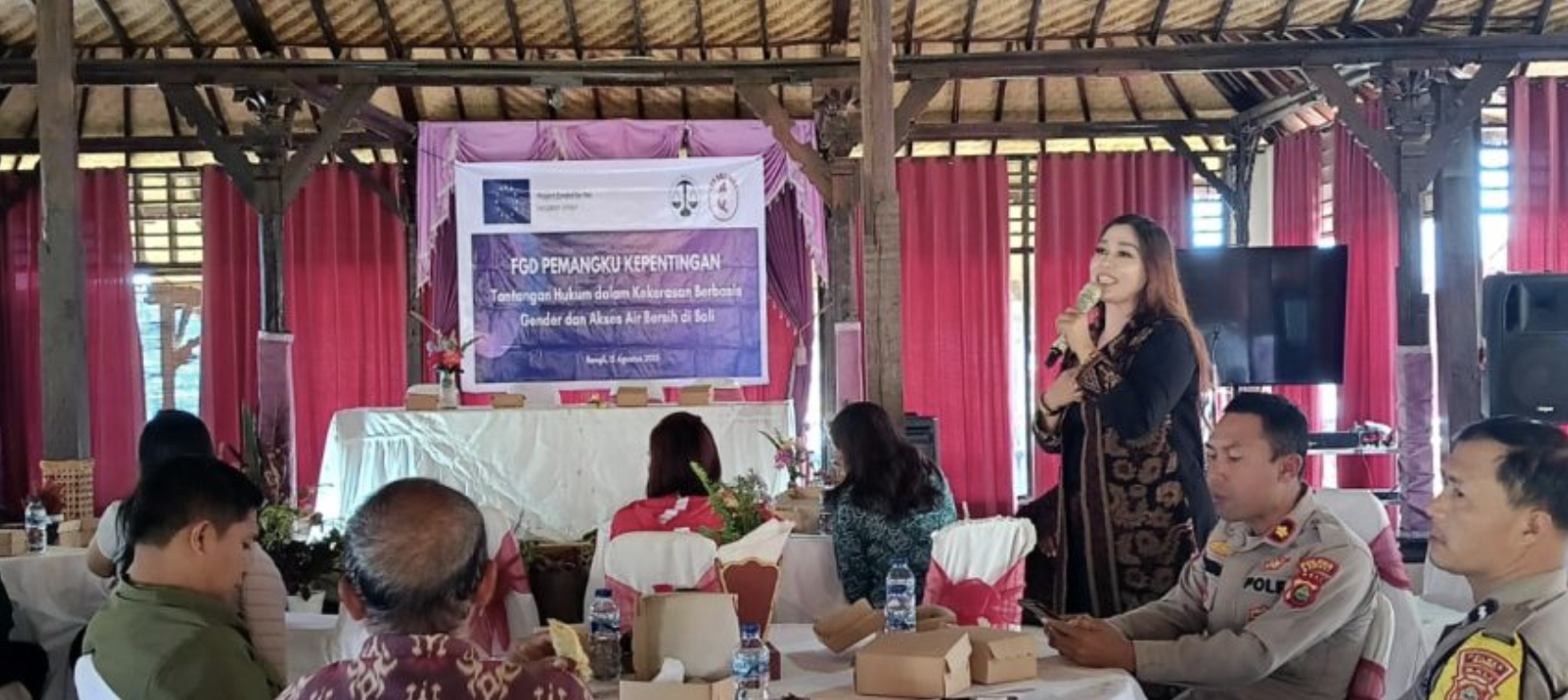Addressing Legal Challenges in Gender-Based Violence and Access to Clean Water in Bali

Ni Nengah Budawati/Photo: Diah
The Water Campaign and Advocacy for Women’s Empowerment in Bali (KAPAS Program) is currently taking place in Kintamani, Bangli. The program was initiated by Ni Nengah Budawati, Director of the Bali Women Crisis Centre Legal Aid Institute (LBH BWCC).
The event was organized in the form of a Focus Group Discussion (FGD) held at Apung Restaurant, a dining venue offering an exotic natural view, on Friday, August 15, 2025.
This FGD carried the theme ‘Legal Challenges in Gender-Based Violence and Access to Clean Water in Bali’ and brought together various stakeholders, including village government officials, law enforcement officers, lawyers, civil society organizations, and survivor communities.
The discussion stemmed from real issues on the ground in Bangli Regency and several other regions of Bali, particularly concerning access to clean water resources due to climate change, resource exploitation, and weak governance.
“We often provide assistance when there are water problems, for example by deploying water tanks during a water crisis. This issue is especially vulnerable in Kintamani, as the area is located in the highlands where water is limited,” said I Made Ari Pulasari, Assistant I of the Bangli Regency Regional Secretary, representing the Regent of Bangli in his remarks.
According to him, such situations often lead to potential conflicts which, if not immediately addressed, can escalate into disputes, either between residents or between communities and other parties.
Within this issue, women are often in the most vulnerable position, bearing the responsibility of providing water for their families while also being exposed to risks of Gender-Based Violence (GBV) amid ongoing conflicts.
This FGD, as part of the KAPAS Program, aimed to identify challenges, share best practices, and formulate gender-responsive policy recommendations that also support environmental justice.
LBH BWCC was selected as one of the JusticeMakers Fellows under the JusticeMakers Women 2024 program, dedicated to women criminal defense lawyers to support and contribute to improving the justice system in Indonesia.
The program is organized by International Bridges to Justice (IBJ) and fully funded by the European Union.
Budawati said the KAPAS Program was designed to respond to this urgent issue by linking the problems of unequal access to clean water with gender-based violence. The issue includes violence within households and communities, as well as forms of structural violence that prevent women from obtaining their basic rights.
“The issues of gender justice and the right to water are deeply connected. Access to clean water is not merely a technical matter of infrastructure, but it involves human rights, ecological justice, and gender justice,” she said.
“The FGD provides a space for stakeholders to dialogue, listen to real-life experiences on the ground, and design collective steps so that legal protection for women and affected communities is truly present and felt,” Budawati added.
She also presented findings from LBH BWCC’s research on the issue of access to clean water within the framework of just and sustainable development, including the impact of water conflicts in local communities and the challenges of law enforcement in gender-based violence cases in water-resource vulnerable areas.
Luh Putu Esty Punyantari from the Bangli District Attorney’s Office noted that the absence of legal norms regarding women’s protection in the context of access to clean water has recently become a concern.
“For example, norms on water availability are currently only regulated in general terms under the Constitution. This needs to be strengthened through more detailed regional regulations as a basis for implementation in the field,” she said.
Esty Punyantari stressed that in efforts to mitigate the potential and escalation of water conflicts in Bangli, related government agencies play a strategic role in ensuring the availability of and access to clean water for all residents, including the most vulnerable groups.
Through this FGD, it is expected that a shared understanding and concrete steps will emerge to strengthen efforts to protect the right to clean water and prevent gender-based violence, in pursuit of social and environmental justice in Bali.
The FGD also became an important momentum to build cross-sector collaboration in addressing the issues of clean water access and gender-based violence, ensuring that the solutions produced truly serve the community and safeguard environmental sustainability.